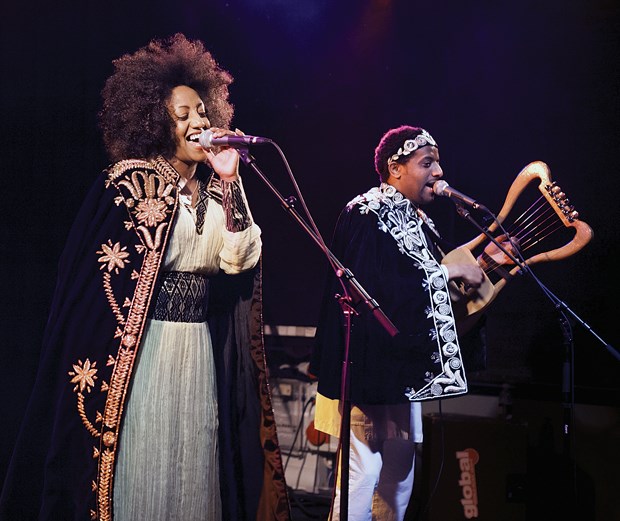Krar Collective at Performance Works, Saturday, Jan. 25, 10 p.m. Tickets $20. Cap Global Roots in association with PuSh International Performing Arts Festival pushfestival.ca.
They're an Ethiopian trio carrying centuries of musical tradition.
The Krar Collective is stripped-down and fast. An ascendant band formed in London, England they combine drums, ululating vocals and the krar.
The six-stringed instrument looks a little like a small harp, but Temesgen Zeleke has electrified it, wielding it like a guitar or a violin as the song calls for. He plucks and strums, sometimes creating a sound reminiscent of traditional Indian music. On a track like "Oromigna" the krarrevs into something you might hear in a spaghetti western movie right before Clint Eastwood empties his gun.
As the band finds its audience and its audience finds them, the krar still draws the most befuddled stares, according to Zeleke.
"Some people they never have seen the krar," he says.
Despite the wandering nature of many instruments, the krar has remained the nearly exclusive property of Ethiopia.
The band is backed by a wide variety of percussion.
Robel Taye's drumming is sometimes heavy enough for hard rock while on some tunes his playing is subtle, as soft as rice shifting in a silk purse.
Taye and Zeleke were friends in Addis Ababa, Ethiopia before they each found their way to London.
Zeleke moved to the bustling capital in 2003, the same year Ethiopia suffered its worst drought in decades.
"I moved to London because I was not really happy about Ethiopian politics at that time," Zeleke says. "The situation was not good."
After arriving, he ran into Taye. A few years later Zeleke met Genet Assefa and the band was complete.
"She's a very wonderful singer," Zeleke says. "We met her in the club, and when I saw her the first time I was very interested in doing a show with her."
Genet often shows incredible power. Her singing is remarkable on "Ambassel," which rhapsodizes Ethiopia's mountainous region.
Unlike most of the group's repertoire, the song has a mournful tune. The instrumentation is spare and Genet's voice is high and big, filling the soundscape.
Zeleke's playing on "Ambassel" keeps the song in the groove. He picks his spots for brief krar improvisations before settling back into the pocket.
Zeleke learned the krar from Mulatu Astatke, and the jazz influence is clear.
Perhaps Ethiopia's most famous musician, Astatke is a composer who has used conga drums and the vibraphone to create slow grooves that could almost be part of a Miles Davis session.
"He was encouraging me and supporting me," Zeleke said. "He did a lot for me to become a great musician."
The band has been compared to The White Stripes, but their sound is much bigger and most of their songs are longer.
On a track like "Guragina" the band goes all out for six minutes. The ululating vocals sound Middle Eastern but the rolling rrr's are straight out of Jackie Wilson.
The group's sound is practised but not polished. Their exertion is sometimes audible in the heavy breaths they take as their songs near their climax.
"We share ideas, share culture," Zeleke says. "Even about the food."
While they play the songs, the band explains about the music, about the culture and traditional songs about love and the beauty of Ethiopia.
Speaking to the North Shore News from Los Angeles just moments before soundcheck, Zeleke talks about the possibility of a new direction.
"Right now we are starting to write our own songs and we create our own meaning," he says.
Whatever the band does, they'll be tied to Ethiopia. Approximately 80 languages are spoken in civilization's cradle, giving the group a seemingly endless supply of information to draw from.
"I miss Ethiopia all the time," Zeleke says. "The good thing is I can go any time now."
The band has brought their sound to Sweden, India, Norway and Ireland.
"Everywhere when people hear our traditional music, they are really very happy," Zeleke says.



